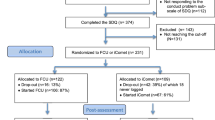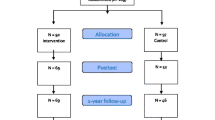Abstract
The primary aim of the present study was to evaluate if previously reported treatment gains of a parent management training (PMT) program, administered via Internet, were retained from post to the 18-month follow-up. Another aim was to evaluate homework compliance as a predictor of short and long-term outcomes. Participants were parents of 58 children (3–11 years) with conduct problems who received a 10-week self-directed PMT program, with limited therapist support. Parents of 32 children (55.2 %) responded at all measurement point (baseline, post-test and follow-up) and analyses showed that child conduct problems continued to decrease during the 18-month period after the intervention whereas parenting skills deteriorated somewhat from post treatment. Pre- to post-treatment change in child conduct problems was predicted by parental engagement in homework assignments intended to reduce negative child behaviors. The findings provide support for the use of Internet-based PMT and stress the importance of parental compliance to homework training.


Similar content being viewed by others
References
Eyberg SM, Nelson MM, Boggs SR (2008) Evidence-based psychosocial treatments for children and adolescents with disruptive behavior. J Clin Child Adolesc Psychol 37:215–237
Dretzke J et al (2009) The clinical effectiveness of different parenting programmes for children with conduct problems: a systematic review of randomised controlled trials. Child Adolesc Psychiatry Ment Health 3:7
Serketich W, Dumas J (1996) The effectiveness of behavioral parent training to modify antisocial behavior in children: a meta-analysis. Behav Ther 27:171–186
Forgatch M (1994) Parenting through change: a programmed intervention curriculum for groups of single mothers. Oregon Social Learning Center, Eugene
Webster-Stratton C (2000) The incredible years training series. Office of Juvenile Justice and Delinquency Prevention Bulletin. Office of Justice Programs. US Department of Justice, Washington, DC, p 1–24
Sanders MR (1999) Triple P-Positive Parenting Program: towards an empirically validated multilevel parenting and family support strategy for the prevention of behavior and emotional problems in children. Clin Child Fam Psychol Rev 2:71–90
Kling Å, Sundell K, Melin L, Forster M (2006) Komet för föräldrar: en randomiserad effektutvärdering av ett föräldraprogram för barns beteendeproblem [Comet for parents: a randomized evaluation of a parenting program for child behavior problems]. FoU-enheten, Stockholms Socialtjänstförvaltning
Kling A, Forster M, Sundell K, Melin L (2010) A randomized controlled effectiveness trial of parent management training with varying degrees of therapist support. Behav Ther 41:530–542
Dishion TJ, Patterson GR (2006) The development and ecology of antisocial behavior in children and adolescents. In: Cicchetti D, Cohen DJ (eds) Developmental psychopathology. Wiley, New York
Reid JB, Patterson GR, Snyder J (2002) Antisocial behavior in children and adolescents: a developmental analysis and model for intervention. American Psychological Association, Washington
Patterson GR (2002) Future extensions of the models. In: Reid JB, Patterson GR, Snyder J (eds) Antisocial behavior in children and adolescents: a developmental analysis and model for intervention. American Psychological Association, Washington
Patterson GR, Forgatch MS, DeGarmo DS (2010) Cascading effects following intervention. Dev Psychopathol 22:949–970
Kazdin AE (1987) Treatment of antisocial behavior in children—current status and future directions. Psychol Bull 102:187–203
Webster-Stratton C (1998) Preventing conduct problems in Head Start children: strengthening parenting competencies. J Consult Clin Psychol 66:715–730
Kazdin AE (1997) Practitioner review: psychosocial treatments for conduct disorder in children. J Child Psychol Psychiatry 38:161–178
Kazdin AE (2000) Treatments for aggressive and antisocial children. Child Adolesc Psychiatr Clin N Am 9:841–858
Sanders MR, Markie-Dadds C, Tully LA, Bor W (2000) The Triple P-positive parenting program: a comparison of enhanced, standard, and self-directed behavioral family intervention for parents of children with early onset conduct problems. J Consult Clin Psychol 68:624–640
Ogden T, Hagen KA (2008) Treatment effectiveness of parent management training in Norway: a randomized controlled trial of children with conduct problems. J Consult Clin Psychol 76:607–621
Furlong M et al (2012) Behavioural and cognitive-behavioural group-based parenting programmes for early-onset conduct problems in children aged 3 to 12 years. Cochrane Database Syst Rev (2):CD008225. doi:10.1002/14651858.CD008225.pub2
Lundahl B, Risser H, Lovejoy M (2006) A meta-analysis of parent training: moderators and follow-up effects. Clin Psychol Rev 26:86–104
Montgomery P, Bjornstad G, Dennis J (2006) Media-based behavioural treatments for behavioural problems in children. Cochrane Database Syst Rev (1):CD002206. doi:10.1002/14651858.CD002206
O’Brien M, Daley D (2011) Self-help parenting interventions for childhood behaviour disorders: a review of the evidence. Child Care Health Dev 37:623–637
Connell S, Sanders MR, MarkieDadds C (1997) Self-directed behavioral family intervention for parents of oppositional children in rural and remote areas. Behav Modif 21:379–408
Markie-Dadds C, Sanders MR (2006) A controlled evaluation of an enhanced self-directed behavioural family intervention for parents of children with conduct problems in rural and remote areas. Behav Change 23:55–72
Hahlweg K, Heinrichs N, Kuschel A, Feldmann M (2008) Therapist-assisted, self-administered bibliotherapy to enhance parental competence—short-and long-term effects. Behav Modif 32:659–681
Sanders MR, Bor W, Morawska A (2007) Maintenance of treatment gains: a comparison of enhanced, standard, and self-directed triple P-positive parenting program. J Abnorm Child Psychol 35:983–998
Enebrink P, Högström J, Forster M, Ghaderi A (2012) Internet-based parent management training: a randomized controlled study. Behav Res Ther 50:240–249
Sanders MR, Baker S, Turner KMT (2012) A randomized controlled trial evaluating the efficacy of Triple P Online with parents of children with early-onset conduct problems. Behav Res Ther 50:675–684
Gardner F, Hutchings J, Bywater T, Whitaker C (2010) Who benefits and how does it work? Moderators and mediators of outcome in an effectiveness trial of a parenting intervention. J Clin Child Adolesc Psychol 39:13
Ryan SM, Boxmeyer CL, Lochman JE (2009) Influence of risk factors for child disruptive behavior on parent attendance at a preventive Intervention. Behav Disord 35:41–52
Hautmann C et al (2011) The severely impaired do profit most: differential effectiveness of a parent management training for children with externalizing behavior problems in a natural setting. J Child Fam Stud 20:424–435
Nix RL, Bierman KL, McMahon RJ (2009) How attendance and quality of participation affect treatment response to parent management training. J Consult Clin Psychol 77:429–438
Garvey C, Julion W, Fogg L, Kratovil A, Gross D (2006) Measuring participation in a prevention trial with parents of young children. Res Nurs Health 29:212–222
Clarke AT et al (2013) Parent attendance and homework adherence predict response to a family–school intervention for children with ADHD. J Clin Child Adolesc Psychol. doi:10.1080/15374416.2013.794697
Baydar N, Reid MJ, Webster-Stratton C (2003) The role of mental health factors and program engagement in the effectiveness of a preventive parenting program for head start mothers. Child Dev 74:1433–1453
Högström J, Enebrink P, Ghaderi A (2013) The moderating role of child callous-unemotional traits in an internet-based parent management training program. J Fam Psychol 27:314–323
Kaufman J et al (1997) Schedule for affective disorders and schizophrenia for school-age children—present and lifetime version (K-SADS-PL): initial reliability and validity data. J Am Acad Child Adolesc Psychiatry 36:980–988
Eyberg S, Pincus D (1999) Eyberg child behavior inventory and sutter-eyberg student behavior inventory-revised: professional manual. Psychological Assessment Resources, Odessa
Axberg U, Hanse JJ, Broberg AG (2008) Parents’ description of conduct problems in their children—a test of the Eyberg Child Behavior Inventory (ECBI) in a Swedish sample aged 3–10. Scand J Psychol 49:497–505
Morawska A, Sanders M (2011) Parental use of time out revisited: a useful or harmful parenting strategy? J Child Fam Stud 20:1–8
Robinson EA, Eyberg SM, Ross AW (1980) The standardization of an inventory of child conduct problem behaviors. J Clin Child Psychol 9:22–29
Goodman R (2001) Psychometric properties of the strengths and difficulties questionnaire. J Am Acad Child Adolesc Psychiatry 40:1337–1345
Muris P, Meesters C, van den Berg F (2003) The Strengths and Difficulties Questionnaire (SDQ)—further evidence for its reliability and validity in a community sample of Dutch children and adolescents. Eur Child Adolesc Psychiatry 12:1–8
Smedje H, Broman JE, Hetta J, von Knorring AL (1999) Psychometric properties of a Swedish version of the “Strengths and Difficulties Questionnaire”. Eur Child Adolesc Psychiatry 8:63–70
Björnsdotter A, Enebrink P, Ghaderi A (2013) Psychometric properties of online administered parental strengths and difficulties questionnaire (SDQ), and normative data based on combined online and paper-and-pencil administration. Child Adolesc Psychiatry Ment Health 7:40
Webster-Stratton C, Reid MJ, Hammond M (2001) Preventing conduct problems, promoting social competence: a parent and teacher training partnership in head start. J Clin Child Psychol 30:283–302
Reid MJ, Webster-Stratton C, Hammond M (2007) Enhancing a classroom social competence and problem-solving curriculum by offering parent training to families of moderate- to high-risk elementary school children. J Clin Child Adolesc Psychol 36:605–620
Cohen J (1988) Statistical power analysis for the behavioral sciences, 2nd edn. Lawrence Erlbaum Associates, New Jersey
Eisenstadt TH, Eyberg S, McNeil CB, Newcomb K, Funderburk B (1993) Parent-child interaction therapy with behavior problem children—relative effectiveness of 2 stages and overall treatment outcome. J Clin Child Psychol 22:42–51
Hundt NE, Mignogna J, Underhill C, Cully JA (2013) The relationship between use of CBT skills and depression treatment outcome: a theoretical and methodological review of the literature. Behav Ther 44:12–26
Mausbach BT, Moore R, Roesch S, Cardenas V, Patterson TL (2010) The relationship between homework compliance and therapy outcomes: an updated meta-analysis. Cognit Ther Res 34:429–438
LeBeau RT, Davies CD, Culver NC, Craske MG (2013) Homework compliance counts in cognitive–behavioral therapy. Cognit Behav Ther 42:171–179
Author information
Authors and Affiliations
Corresponding author
Rights and permissions
About this article
Cite this article
Högström, J., Enebrink, P., Melin, B. et al. Eighteen-Month Follow-Up of Internet-Based Parent Management Training for Children with Conduct Problems and the Relation of Homework Compliance to Outcome. Child Psychiatry Hum Dev 46, 577–588 (2015). https://doi.org/10.1007/s10578-014-0498-7
Published:
Issue Date:
DOI: https://doi.org/10.1007/s10578-014-0498-7




